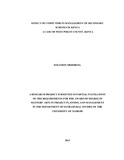| dc.description.abstract | The main purpose of this study was to the utilization of computers in
management of secondary schools in Kenya, a case of West Pokot County,
Kenya. The specific objectives of the study: to find out the factors that
influence the integration in school management, to determine the role of the
principal in integration of ICT in school management, to find out investigate
the level of integration of ICT in school management, to establish the extent
of head teachers’ and teachers’ accessibility to ICT resources and to find out
determine the barriers to integration of ICT in school management. The
survey research design will be utilized in the study. The study was guided by
the systems theory as stated by Kast and Rosenzweig (1985). The theory
considers the school basically as an open socio-technical system composed of
five major partly overlapping and interdependent sub-systems namely
managerial, structural, psychological, technical goals and values. The study
employed a descriptive survey research design. The study targeted teachers
and head teachers of secondary schools in the area of study. Data was
collected mainly through questionnaire and interview schedule. Data was
analyzed using descriptive statistical techniques, that is, the means,
percentages and modes. The study established most of the principals enhanced
staff training and development and mobilized resources necessary for
computers and encourages staff to embrace computer. It is also implied that
majority of the principals recognize and reward efforts made by staff in
Computer determination. The other objective of the study was to investigate
the level of determination of computer in school administration. As a result, it
was established that use of computer in school management had improved the
quality of information and made the school more efficient while performing
its tasks. The study revealed that accessibility by the teachers to computers
resources was hampered by the number of computers. From the analysis done
in chapter four, it can be concluded that computers were few and the ones
available lacked adequate software programmes. This therefore limited
accessibility of the teachers to compute resources. There is therefore limited
accessibility to Computer in schools. From the analysis done, it was revealed
that barriers to determination of computer in school administration in some
schools included difficulty in suing software, lack of time, lack of necessary
skills and to a small extent lack of interest by the teachers. It is also revealed
that to some extent that unavailability of computers hindered use of computers
determination in school management. Based on the findings and conclusions
of the study, the study concluded that the government should ensure
accessibility of computers to all schools in the country through partnering
with other educational stakeholders to ensure that ICT can aid school
managers in management of schools. | en |

